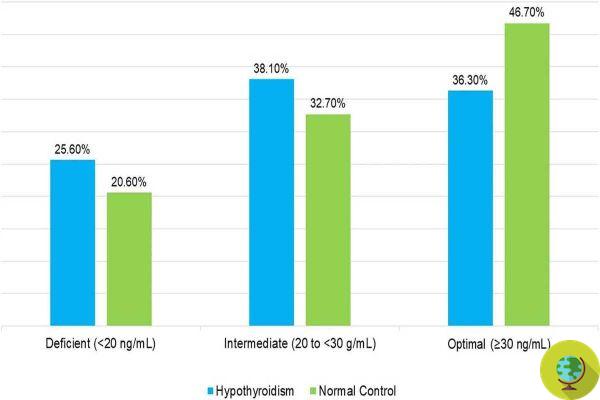A recent study investigated the possible correlation between vitamin D deficiency and autoimmune hypothyroidism
Don't store avocado like this: it's dangerousA recent study investigated the possible correlation between vitamin D deficiency and autoimmune hypothyroidism
A new search demonstrated how the Vitamin D deficiency can increase the risk of developing autoimmune hypothyroidism.
Adequate levels of vitamin D through sun exposure or by taking dietary supplements could prevent autoimmune hypothyroidism, in which the immune system attacks its own thyroid cells. In addition, undergoing a screening to assess the deficiency especially among the people most at risk, such as the elderly, the obese, the sedentary etc ... and carrying out a prompt treatment with food supplements could significantly reduce the risk of long-term hypothyroidism. (Read also: Hypothyroidism: the beneficial effects of black cumin on Hashimoto's thyroid)
A systematic review
The researchers analyzed data from 7.943 adults 20 years of age and older who participated in the National Health and Nutrition Examination Survey from 2007 to 2012. Participants were classified based on serum levels of 25-hydroxyvitamin D.
Vitamin D deficiency was defined as less than 20 ng / mL, intermediate levels were defined as 20 ng / mL to 30 ng / mL, and optimal vitamin D was defined as 30 ng / mL or more. Participants were considered suffering from hypothyroidism if they had a thyroid stimulating hormone level above 5,6 mIU / L or if they were on levothyroxine therapy. Those with a TSH between 0,34 mIU / L and 5,6 mIU / L and who were not taking any thyroid medication were classified as normal; the results showed that 7,7% had hypothyroidism.

@BMC
The surprising discovery was that most of the participants practiced very little physical activity and consumed alcohol; this has been associated with compromised vitamin D status and, therefore, may have led to hypothyroidism. In fact, there is thought to be a significant association between vitamin D level and hypothyroidism, with 25,6% of hypothyroid patients having vitamin D deficiency compared to 20,6% of normal controls.
Those with hypothyroidism had a higher prevalence of obesity (40,5% vs 33,4%), hypertension (47,1% vs 29,5%), diabetes (19,7% vs 10,7%) e dyslipidemia (54,9% versus 44,7%; P <.001 for all), compared to those who did not have hypothyroidism. This study will serve for future research, which should focus on early screening to promptly treat cases of vitamin D deficiency, especially among the elderly, obese, and sedentary.
Follow us on Telegram | Instagram | Facebook | TikTok | Youtube
Photos: BMC
On the vitamin D could it be interesting for you:
- Vitamin D deficiency: the sign to look for when waking up in the morning in winter
- The exercises to do at sunrise to fill up on vitamin D and more
- The best vitamin D for children
- Vitamin D: in your muscles a sign of deficiency that you should pay attention to especially if you are over 60 years old
On the thyroid could it be interesting for you:
- Hyperthyroidism: What happens if the thyroid is working too much?
- "Thyroid bonus", what it is and how to apply
- Thyroid: 4 things to watch out for and how to book your free visit
- Hashimoto's thyroiditis: what to eat to help the thyroid


























